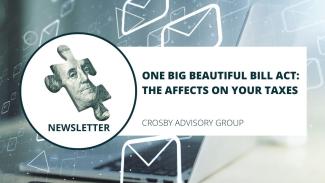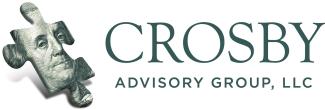
One Big Beautiful Bill Act Tax Changes That Will Affect You
One Big Beautiful Bill Act Tax Changes That Will Affect You
The One Big Beautiful Bill Act (OBBBA) that passed earlier this year made some changes to the tax code that will likely affect you. First of all, for tax planning going forward, Federal tax brackets will remain the same at 10%, 12%, 22%, 24%, 32%, 35%, and 37% (gross) depending on income level. If you are interested in seeing what income levels correspond to each tax bracket you can find it here. For 2025, the tax brackets won't change, but in 2026 the OBBBA will give the 10% and 12% bracket an additional inflation adjustment, boosting the amount of money taxed at those lower rates. In practical terms, that means all taxpayers will see slightly lower taxes.
In 2025, the standard deduction will rise by $750 to $15,750 for single filers, and $1,500 to $31,500 for joint filers. Taxpayers aged 65 and older also qualify for the additional standard deduction, amounting to an extra $2,000 for single filers and an extra $1,600 for each eligible married filer. The OBBBA created a new tax deduction that grants taxpayers age 65 and older an even larger deduction of up to $6,000 for single filers, or $12,000 for qualified married couples.
This tax deduction for seniors is phased out at the following income limits:
- For single filers the MAGI limit is $75,000 and it is completely phased out at $175,000.
- For joint filers the MAGI limit is $150,000 and it is completely phased out at $250,000.
This deduction is available whether you take the standard deduction or itemize.
Some taxpayers may be able to deduct up to $10,000 in car loan interest for new vehicles purchased between 2025 and 2028. Used cars are ineligible. To qualify, the vehicle needs to have undergone final assembly in the United States. The deduction begins to phase out if your MAGI exceeds $100,000 for single filers, or $200,000 for joint filers.
What about student loan and tax credit for children? The deduction for student loan interest—up to $2,500 per year—remains in place. The OBBBA bumps the child tax credit up to $2,200 per child in 2025
The ability to deduct home mortgage interest will remain intact for those who itemize their deductions. Starting in 2026, the maximum amount will be indexed to inflation. The $750,000 limit on home mortgage interest deduction is made permanent ($1 million for mortgages in place before Dec. 16, 2017). Starting in the 2026 tax year, the OBBBA permanently reinstates the ability of homeowners to deduct mortgage insurance premiums.
We also have adjustments for 529 (college saving) plans. 529 college savings plans are now more flexible by expanding the list of education-related expenses that qualify for tax-free withdrawals. For example, 529s can now be used for expenses like books, tutoring fees, and college-prep materials for K-12 students. In addition, the OBBBA increases the annual limit on 529 withdrawals for K-12 educational expenses from $10,000 to $20,000 per year beginning in 2026. Overall, with income being equal, you should see a smaller Federal tax bill.
Note: This Information was provided to Crosby Advisory Group, LLC by Charles Schwab
Disclaimer: Crosby Advisory Group, LLC is a registered investment advisor. This podcast is for general knowledge and is not intended to be individual investment advice. Investing involves risk including potential for loss. Understand all risk and fees before investing. NMD Insurance is affiliated with Crosby Advisory Group, LLC.

